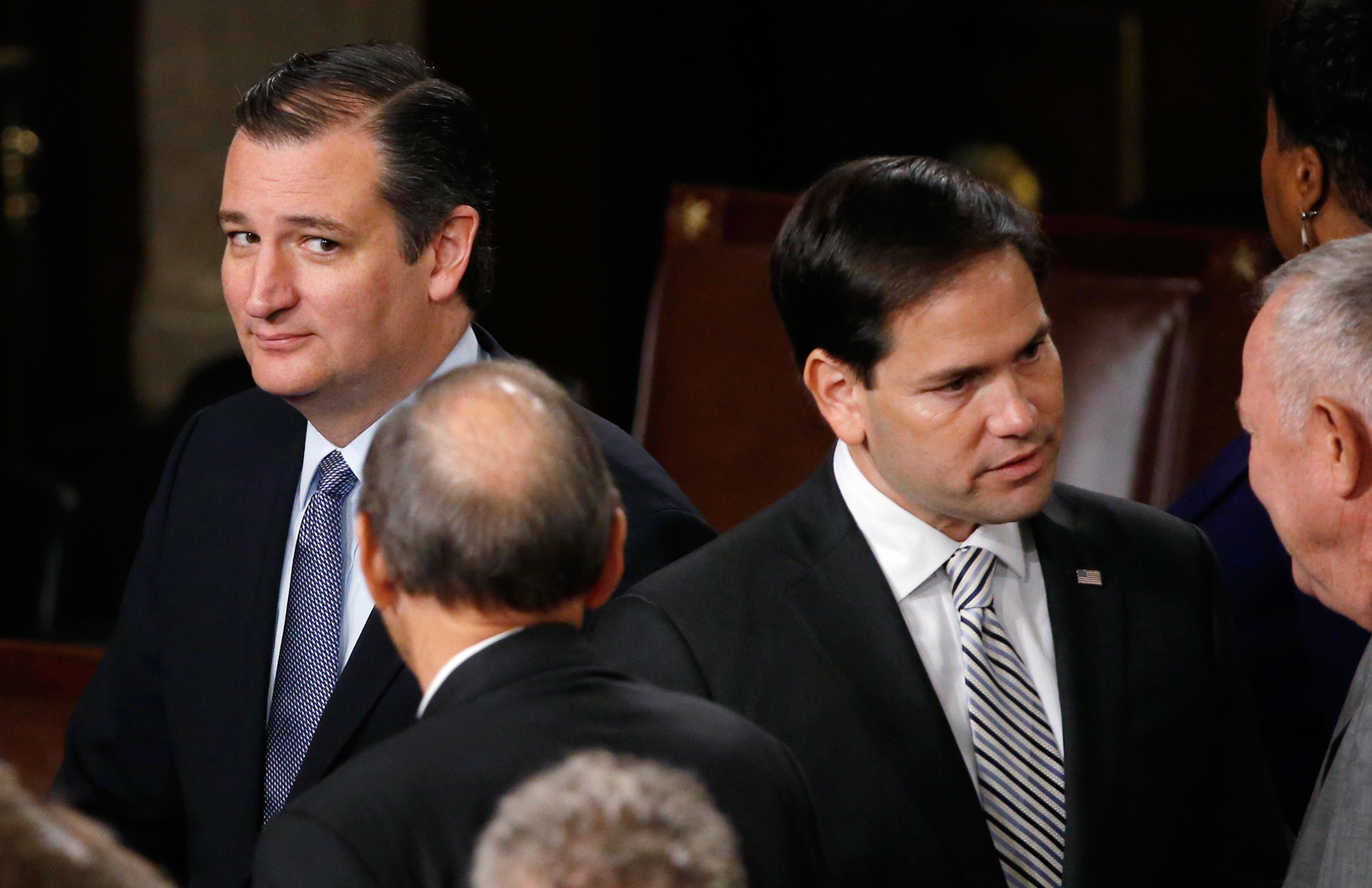
A bitter rivalry between two freshman Senators has become the most riveting subplot in the race for the Republican presidential nomination. For weeks, the sniping has only grown louder. When Florida Senator Marco Rubio says Texas Senator Ted Cruz voted on budgets to “hurt the military,” Cruz fires back that Rubio embraces “military adventurism,” including standing with Hillary Clinton in the strategy to topple Libyan dictator Muammar Gaddafi. When Cruz attacks Rubio for working with Democrats on a path to citizenship for immigrants in the country illegally, Rubio’s aides are quick to contend that Cruz also supported a different type of legal status for the same group.
“There are Republicans, including Senator Cruz, that have voted to weaken those programs,” Rubio says of the National Security Agency’s domestic-spying powers. Cruz jokes at events that supporters should leave their cell phones on “because I want President Obama to hear every word we say.”
So it has gone, day after day, and so it will continue, with both men jockeying for position in early polls with political amateurs Donald Trump and Ben Carson. The feud between Cruz and Rubio represents a battle for the soul of the Grand Old Party and, perhaps more important, its future. In the 2016 Republican field, no two candidates share so similar a background–both freshman Senators with Cuban and Tea Party roots–yet have such divergent visions for the GOP.
Their disagreement begins with opposing prescriptions to fix what ails their party: Rubio wants to reshape the electorate with an appeal to Hispanic and younger voters, while Cruz wants to energize mostly white evangelical Christians, whom he contends have stayed home out of disgust with the two previous nominees. You could say one represents the ego of the Tea Party and the other its id.
The rivalry has been years in the making. When Cruz was trying to win the Texas nomination for the Senate in 2012, he repeatedly sought the endorsement of Rubio, a newly elected star who’d trod the same anti-Establishment path two years earlier in Florida. But the charismatic Floridian withheld his imprimatur and dodged meetings with the confident Texan at the urging of his fellow Republicans. Cruz has not forgotten the slight. When given the chance for retribution, Cruz took it, leading the opposition in 2013 against Rubio’s work on a comprehensive immigration bill, which earned the White House’s backing and passed the Senate, only to die in the House.
The two men’s personal styles bear no resemblance to each other. When Rubio arrived in Washington, he set out to learn how the Senate works, linking up with reform-minded leaders and defense hawks like Senator John McCain of Arizona, only to find himself dragged into the constant fight against his own party. He kept his head down, busied himself in committee meetings and sought respect from his colleagues by pitching in when asked.
Cruz, by contrast, went to Washington to plot the destruction of the city’s Establishment power networks. A self-appointed hell-raiser, he threw tantrums, routinely insulted his party’s leadership and was shameless in promoting his own brand. Senators tried to bring him into the fold, electing him vice chair of their campaign committee, only to see him raise cash for candidates who were challenging incumbent colleagues, prompting his ouster. His Senate critics–and there are many–say he seldom spoke up at Republicans’ weekly lunches but had no problem leaving the ornate dining room off the Senate floor and making a beeline to reporters. Tables were barely cleared of china before it was clear Cruz was not on the team.
Rubio, the son of a bartender, and Cruz, the son of a political refugee, have shown they can be gritty–and petty–in their ambition. Cruz enjoys the upper hand in building a political machine and recruiting fervent followers, while Rubio’s potential is just starting to materialize. The personal animus between the two colors so much about their interactions, and both seem likely to be among the last contenders chasing the nomination. The stakes for this sparring are high. But so is the potential to reshape American politics.
More Must-Reads from TIME
- Donald Trump Is TIME's 2024 Person of the Year
- Why We Chose Trump as Person of the Year
- Is Intermittent Fasting Good or Bad for You?
- The 100 Must-Read Books of 2024
- The 20 Best Christmas TV Episodes
- Column: If Optimism Feels Ridiculous Now, Try Hope
- The Future of Climate Action Is Trade Policy
- Merle Bombardieri Is Helping People Make the Baby Decision
Write to Philip Elliott at philip.elliott@time.com